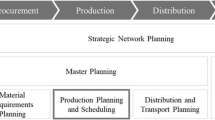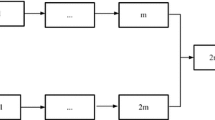Abstract
This paper focuses on a scheduling problem in a manufacturing system composed of multiple parallel assembly lines. There are multiple orders to be processed in this system, and each order is specified by the product type, the number of products to be processed, and the due date. Each product is composed of two types of subassemblies, one unit of an external subassembly and one or more units of an internal subassembly. In the system, the parallel assembly lines are not identical, and certain lines are designated for certain product types. We present heuristic algorithms for the scheduling problem with the objective of minimizing total tardiness of orders. For an evaluation of the performance of the suggested algorithms, computational experiments are performed on a number of problem instances and results show that the suggested algorithms work better than the method used in a real manufacturing system.
Similar content being viewed by others
References
Gupta JND, Ruiz-Torres AJ (2000) Minimizing makespan subject to minimum total flow-time on identical parallel machines. Eur J Oper Res 125:370–380
Jin ZH, Ohno K, Ito T, Elmaghraby SE (2002) Scheduling hybrid flowshops in printed circuit board assembly lines. Prod Oper Manag 11:216–230
Lin CH, Liao CJ (2008) Makespan minimization for multiple uniform machines. Comput Ind Eng 54:983–992
Azizoglu M, Kirca O (1998) Tardiness minimization on parallel machines. Int J Prod Econ 55:163–168
Yalaoui F, Chu C (2002) Parallel machine scheduling to minimize total tardiness. Int J Prod Econ 76:265–279
Shim SO, Kim Y-D (2007) Scheduling on parallel identical machines to minimize total tardiness. Eur J Oper Res 177:135–146
Wilkerson LJ, Irwin JD (1971) An improved algorithm for scheduling independent tasks. IIE Trans 3:239–245
Dogramaci A, Surkis J (1979) Evaluation of a heuristic for scheduling independent jobs on parallel identical processors. Manage Sci 25:1208–1216
Ho JC, Chang YL (1991) Heuristics for minimizing mean tardiness for m parallel machines. Nav Res Logist 38:367–381
Kim SS, Shin HJ, Eom DH, Kim CO (2003) A due date density-based categorizing heuristic for parallel machines scheduling. Int J Adv Manuf Technol 22:753–760
Biskup D, Herrmann J, Gupta JND (2008) Scheduling identical parallel machines to minimize total tardiness. Int J Prod Econ 115:134–142
Lee YH, Pinedo M (1997) Scheduling jobs on parallel machines with sequence-dependent setup times. Eur J Oper Res 100:464–474
Park MW (2000) A genetic algorithm for the parallel-machine total weighted tardiness problem. Journal of the Korean Institute of Industrial Engineers 26:183–192
Wu Y, Ji P (2009) A scheduling problem for PCB assembly: a case with multiple lines. Int J Adv Manuf Technol 43:1189–1201
Liaw CF, Lin YK, Cheng CY, Chen M (2003) Scheduling unrelated parallel machines to minimize total weighted tardiness. Computers and Operations Research 30:1777–1789
Shim SO, Kim Y-D (2007) Minimizing total tardiness in an unrelated parallel-machine scheduling problem. J Oper Res Soc 58:346–354
Chen JF, Wu TH (2006) Total tardiness minimization on unrelated parallel machine scheduling with auxiliary equipment constraints. Omega 34:81–89
Kim Y-D (1987) On the superiority of a backward approach in list scheduling algorithms for multi-machine makespan problems. Int J Prod Res 25:1751–1759
Kim Y-D (1995) A backward approach in list scheduling algorithms for multi-machine tardiness problems. Computers and Operations Research 22:307–319
Blocher JD, Chhajed D (1996) The customer order lead-time problem on parallel machines. Nav Res Logist 43:629–654
Yang J, Posner ME (2005) Scheduling parallel machines for the customer order problem. J Sched 8:49–74
Leung JY-T, Li H, Pinedo M (2005) Order scheduling in an environment with dedicated resources in parallel. J Sched 8:355–386
Leung JY-T, Lee CY, Ng CW, Young GH (2008) Preemptive multiprocessor order scheduling to minimize total weighed flowtime. Eur J Oper Res 190:40–51
Leung JY-T, Li H, Pinedo M (2006) Approximation algorithms for minimizing total completion time of orders on identical machines in parallel. Nav Res Logist 53:243–260
Leung JY-T, Li H, Pinedo M (2007) Schedule orders for multiple product types to minimize total weighted completion time. Discrete Appl Math 155:945–970
Leung JY-T, Li H, Pinedo M, Zhang J (2007) Minimizing total weighed completion time when schedule orders in a flexible environment with uniform machines. Inf Process Lett 103:119–129
Ahmadi R, Bagchi U, Roemer TA (2005) Coordinated scheduling of customer orders for quick response. Nav Res Logist 52:493–512
Serafini P (1996) Scheduling jobs on several machines with the job splitting property. Oper Res 44:617–628
Leung JY-T, Li H, Pinedo M (2006) Schedule orders for multiple product types with due date related objectives. Eur J Oper Res 168:370–389
Kim Y-D, Shim SO, Kim SB, Choi YC, Yoon HM (2004) Parallel machine scheduling considering a job splitting property. Int J Prod Res 42:4531–4546
Shim SO, Kim Y-D (2008) A branch and bound algorithm for an identical parallel scheduling problem with a job splitting property. Computers and Operation Research 35:863–875
Kim DW, Na DG, Chen FF (2003) Unrelated parallel machine scheduling with setup times and a total weighted tardiness objective. Robot Comput-integr Manuf 9:173–181
Logendran R, Subur F (2004) Unrelated parallel machine scheduling with job splitting. IIE Trans 36:359–372
Panwalkar SS, Smith ML, Koulamas CP (1993) A heuristic single machine tardiness problem. Eur J Oper Res 70:304–310
Russel RS, Dar-El EM, Taylor BS III (1987) A comparative analysis of the COVERT job sequence rule using various shop performance measures. Int J Prod Res 25:1523–1540
Vepsalainen AP, Morton TE (1987) Priority rules for job shops with weighted tardiness cost. Manage Sci 33:1035–1047
Lee GC, Kim Y-D, Choi SW (2004) Bottleneck-focused scheduling for a hybrid flowshop. Int J Prod Res 42:165–181
Author information
Authors and Affiliations
Corresponding author
Rights and permissions
About this article
Cite this article
Choi, YC., Kim, YD. & Bang, JY. Scheduling algorithms for an air conditioner manufacturing system composed of multiple parallel assembly lines. Int J Adv Manuf Technol 51, 1225–1241 (2010). https://doi.org/10.1007/s00170-010-2692-5
Received:
Accepted:
Published:
Issue Date:
DOI: https://doi.org/10.1007/s00170-010-2692-5




